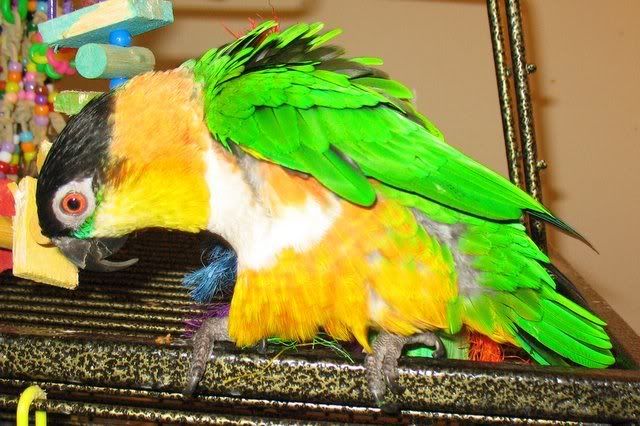I wanted to ask you about the differences between your Congo and Timneh. I've heard that Congos tend to be more timid. Is Stella more shy around new people/things than Max? Are there other differences in behavior that you've noticed?
I thought I'd respond in a post rather than a long comment. First, what a fun website! Bibi is very talented and I can't wait to explore her website a bit more!
Now, back to the question at hand: timneh vs. congo personalities.
As always, I have to put in a bit of a disclaimer. We can definitely talk generalities, but since each parrot is an individual, those characteristics will not necessarily show up in every individual. I only live with two greys -- one congo (Stella) and one timneh (Max) but have volunteered at a parrot rescue for over 6 years and have interacted with hundreds of greys (more congos than timnehs) during that time frame. Those hundreds of greys have ranged from severely abused and neglected birds that were surrendered to severely pampered birds who were coming in for grooming, and everything in between.
In my house, there is not a big personality difference between Stella and Max. They are both equally bonded to Thomas and me. If I were to write out descriptions of their behavior, there's no way that anyone would be able to tell which one was the congo and which one was the timneh. There are two main differences that I can think of: Max dances while Stella refuses to (though I have known dancing congos), and Stella is actually better with strangers than Max. If someone comes to our home, Max will usually fly away and not step up; Stella, on the other hand, steps up, though you can tell she didn't really want to leave me.
When we first got Stella, her previous owner had told the rescue that she was terrified of new toys and perches. That wasn't true in our house, and she'll investigate a new toy as eagerly as Max will. They both have an insatiable curiosity and are constantly exploring new things, probably hoping a nut will somehow appear!
It's really at the rescue where I volunteer that I've seen the most personality differences. In general, the timnehs at the rescue will come out and step up for just about anyone who is calm and asks them nicely. Some congos will do so, but more often than not, they run to the back of their cage to escape the intruder or try to bite. It generally takes more time to gain the trust of a congo than a timneh. The timnehs seem a bit more resilient in the face of what must be a terrifying experience (being left by your family at an unfamiliar place -- in the wild, this would mean almost certain death for these prey animals).
In my opinion, a lot of this has to do with their start in life. Though timnehs are gaining in popularity, congos are in higher demand. They are more expensive and easier to sell -- more profitable. They are much more likely to be raised in production facilities (akin to puppy mills) and shipped off to pet stores, missing out on much of the crucial development stage as they sit alone in cages without much interaction, human or avian. Timnehs were more often raised by small scale breeders who treated the babies as part of the family until they left for their new home. They were abundance weaned, had plenty of toys, and had lots of interaction with other babies, perhaps some older birds, and humans. I think many of the stereotypes and generalizations of congo vs. timneh behavior stem from this. In particular because most pet stores are not very concerned with whether the person buying the parrot knows what they're doing -- they just want their money; on the other hand, small-scale breeders typically are about as hard to get a bird from as many rescues. They want to make sure their baby will be in good hands. There are no impulse purchases. Of course, there are many exceptions to what I've just said!
I'm not saying that a sub-optimal start in life dooms the parrot. We traced his band and Rocky was hatched at one of the worst bird mills around and he is quite delightful, for a severe macaw. Stella's original owner purchased her from a pet store, which means she likely was production raised. Breeders who spend a lot of time raising their parrots typically want to meet and vet potential owners. When we purchased Max, her breeder grilled us for several hours before deciding to allow us to purchase her. Yet, both Stella and Max have similar personalities now. In a good home, I believe that much of the damage of a sub-optimal start can be undone.
In conclusion, based on my limited experience, congos and timnehs make equally wonderful companions -- in the right home. If I were to add another grey to my home, I wouldn't go into my search with the thought of adopting a congo or timneh. I would just find a grey at the rescue that seemed to like me. For someone who wants to get one from a breeder, I'd recommend researching breeders and finding one who carefully raises their babies -- congos or timnehs.


No comments:
Post a Comment